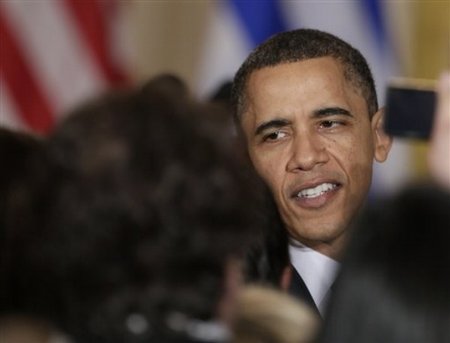
Setting aside the policy issues involved in Libya, it's worth highlighting the legal debate on the constitutionality of President Obama's policy action. The accusations of unconstitutional activity here are overwhelmingly from non-lawyers - both from libertarians, the paleoconservative right and the anti-war left.
Many of the same factions claimed George W. Bush went far beyond the Constitution's limitations, but I think it's notable that Bruce Ackerman declares the activity unconstitutional from the left, even as he concedes that Obama is going beyond the limits of what Bush did:
The War Powers Resolution doesn't authorize a single day of Libyan bombing. But it does provide an escape hatch, stating that it is not "intended to alter the constitutional authority of the Congress or of the President." So it's open for Obama to assert that his power as commander in chief allows him to wage war without Congress, despite the Constitution's insistence to the contrary.Many modern presidents have made such claims, and Harry Truman acted upon this assertion in Korea. But it's surprising to find Obama on the verge of ratifying such precedents. He was elected in reaction to the unilateralist assertions of John Yoo and other apologists for George W. Bush-era illegalities. Yet he is now moving onto ground that even Bush did not occupy. After a lot of talk about his inherent powers, Bush did get Congress to authorize his wars in Afghanistan and Iraq. Now, Obama is putting Bush-era talk into action in Libya -- without congressional authorization.
Ackerman mentions Yoo, who makes a strong case for the constitutionality of Obama's actions in Libya:
Mr. Obama once agreed with his Democratic colleagues, saying in 2007 that "The president does not have power under the Constitution to unilaterally authorize a military attack in a situation that does not involve stopping an actual or imminent threat to the nation." Fast forward four years: Last Monday, Mr. Obama notified Congress that he ordered military action in Libya "pursuant to my constitutional authority to conduct U.S. foreign relations and as Commander in Chief and Chief Executive."For once, Mr. Obama has the Constitution about right. As Alexander Hamilton wrote in Federalist 74, "The direction of war implies the direction of the common strength, and the power of directing and employing the common strength forms a usual and essential part in the definition of the executive authority." Presidents should conduct war, he wrote, because they could act with "decision, activity, secrecy, and dispatch." In perhaps his most famous words, Hamilton wrote that "Energy in the executive is a leading character in the definition of good government. . . . It is essential to the protection of the community against foreign attacks."
The truth is that Mr. Bush's case for constitutional authority far outstrips Mr. Obama's. In 2001 and 2002, Mr. Bush won legislative approval for both the Afghanistan and Iraq wars even though he didn't need it.
There are not just legal concerns here though, but practical ones:
Congress is too fractured, slow and inflexible to manage war. Its loose, decentralized structure would paralyze American policy while foreign threats loom. The Framers understood that Congress's real power would lie in the purse. During the 1788 Virginia ratifying convention, Patrick Henry attacked the Constitution for failing to limit presidential militarism. James Madison replied: "The sword is in the hands of the British king; the purse is in the hands of the Parliament. It is so in America, as far as any analogy can exist."
Yoo plans to supplement his piece with several posts at Ricochet on the statements of the Founders on the issue. I look forward to seeing these items; I've read many of them myself, but they tend to get glossed over in these arguments (and often by those who are all about citing the Founders).
From my perspective, Yoo's arguing from a position that has a far longer historical ancestry in interpreting the constitutional role of the presidency - a view that has effectively been in place since Thomas Jefferson's war against the Barbary Pirates. The burden is on those who believe that Congress actually has a minute-by-minute, day-by-day management role to play in the realm of modern warfare, both for practical and principled reasons, to make the case for what seems to me a very different definition of the role of the Commander in Chief.
(AP Photo)



